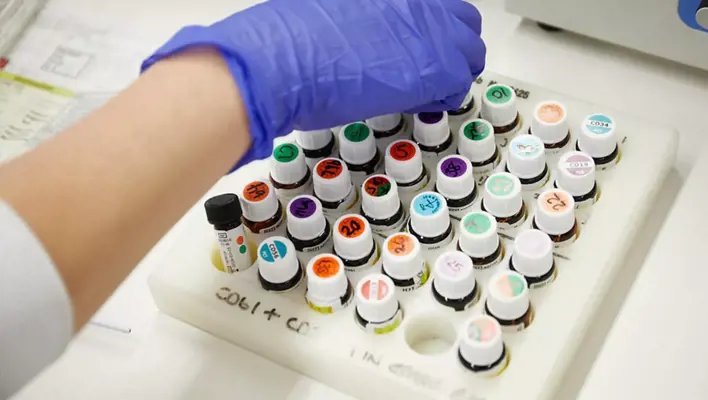Almost 17,000 patients have participated in research at The Christie since 2014. Anyone can volunteer to take part in a clinical research study or trial. Depending on the kind of study or trial, volunteers may have a drug or other treatment administered or be asked to fill in a questionnaire or give samples.
You can read academic papers about our completed clinical research studies and trials on The Christie publications repository. You can also see our latest research news and patient stories on our research news page.
Find a study or trial
To find out about studies and trials currently taking place at The Christie and elsewhere in the UK see the Cancer Research UK (CRUK) trials database. For information about taking part in medical research see the National Institute for Health Research (NIHR) be part of research and NIHR People in Research database.
How to take part in a study or trial - step-by-step guide
- Step 1 - discussion
You can suggest taking part in a clinical research study or trial to your GP or consultant or they may suggest it to you. - Step 2 - find a study
Your clinician will look for studies and trials you might be suitable for. You can also search yourself on the CRUK clinical trial database. - Step 3 - referral
If your clinician identifies a suitable study or trial they will refer you to the organisation running it and send your medical records. You cannot take part without being referred and you also cannot contact the study delivery team directly yourself at this stage. - Step 4 - screening
The study delivery team will look at your medical notes to see if you are suitable. They may ask your clinician to run some more tests with you. - Step 5 - enrolment
The study delivery team will get in touch with you. They’ll explain the aims, treatment being trialled and what to expect in terms of side effects and hospital visits. You and your clinician will be asked to sign a consent form giving permission to share your medical information for the study or trial. - Step 6 - taking part
Clinical research studies and trials can run for anything from a few months to several years. During that time you may need to go into hospital for a few hours every few weeks to receive the treatment, or you may be able to take it at home. You may be monitored for any effects and asked to fill in questionnaires or answer questions. This may also take place in hospital. - Step 7 - findings
After the study or trial is finished its findings will be written up as a paper and published in an academic journal. All the papers about our clinical research studies and trials are published on The Christie publications repository.
Eligibility for studies or trials
|
Scenario |
Requirements |
|---|---|
|
Patient is ordinarily resident* in the UK |
|
|
Patient is resident within one of the Devolved Nations (Wales/ Scotland/ NI) |
|
|
Patient is not resident within the UK or the Devolved Nations |
There are several routes of application to come to the UK so we wouldn’t be able to advise on the most appropriate, however for anyone to receive unplanned NHS treatment.
Visas just allowing access to work/ travel through, etc. will not meet the requirement. The Visa/ approved application will state on it whether access to public funds is included or not and proof of this will be required. |
*Ordinarily resident means living in the UK on a lawful and properly settled basis.

